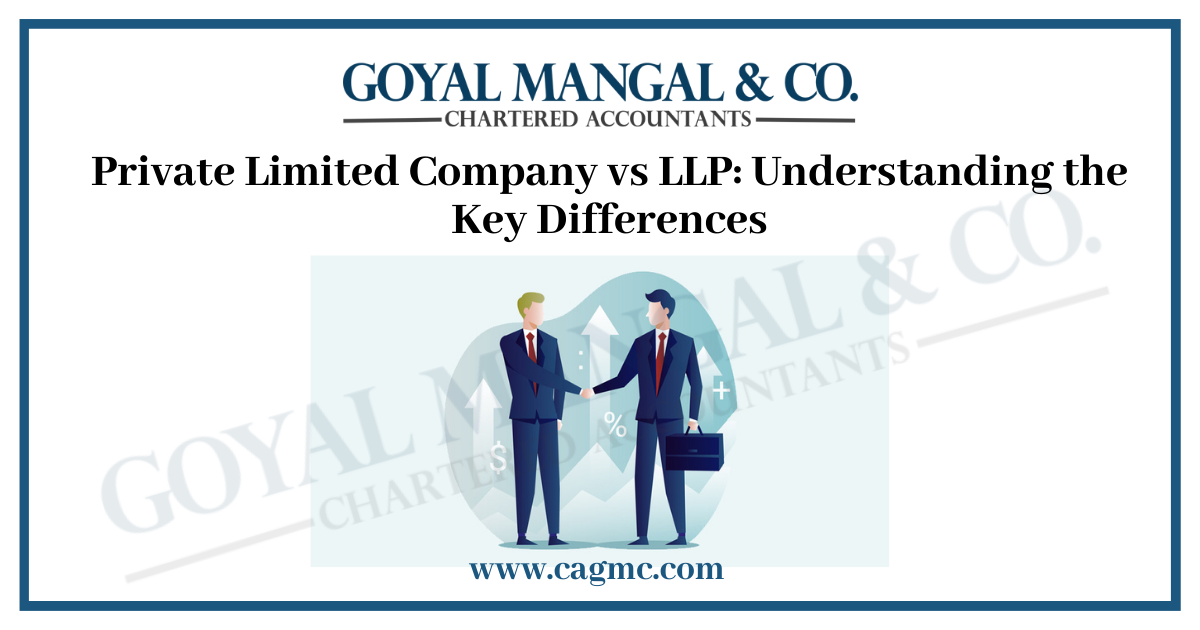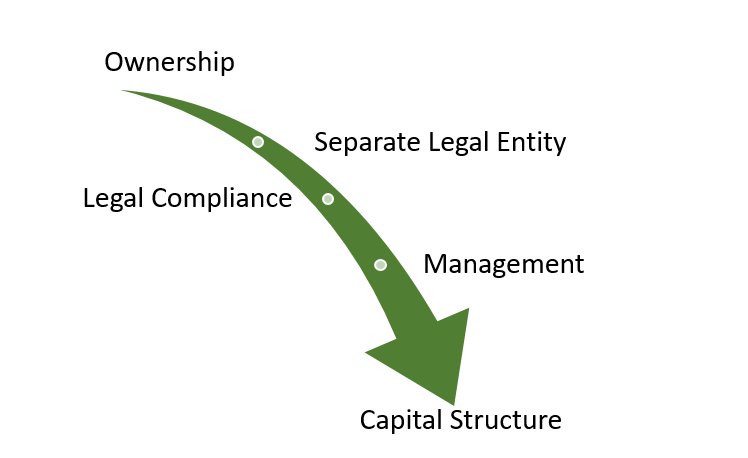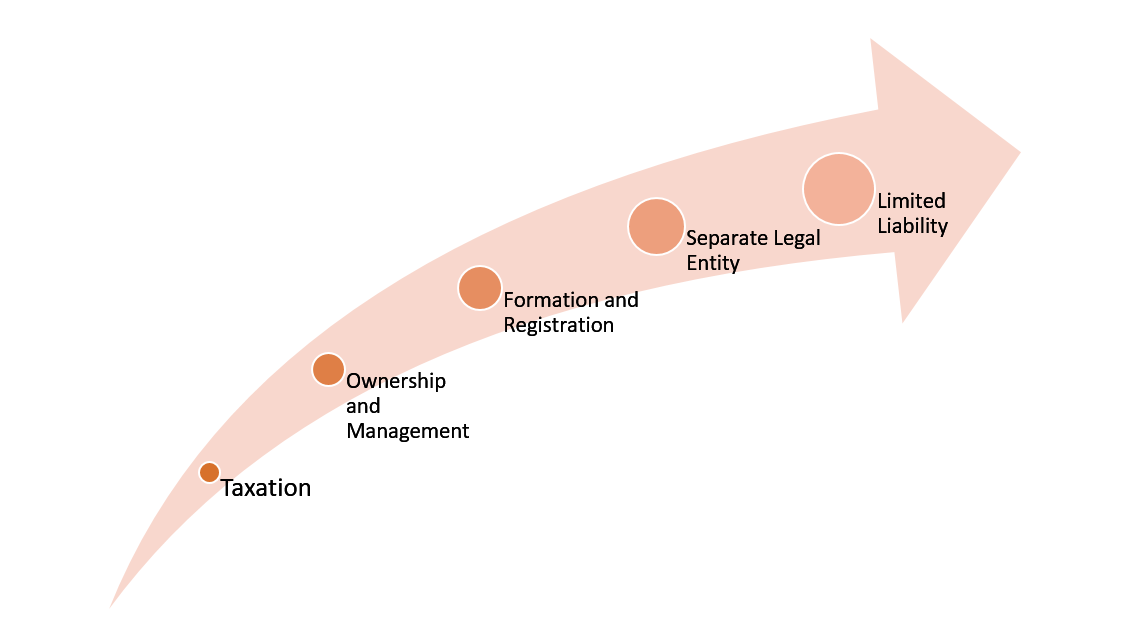
When starting a new business or observing any change in legal structure, entrepreneurs often find themselves comparing different business entities. Two popular choices that offer distinct advantages are Private Limited Company vs LLPs. Understanding the differences between these entities is significant for making an informed decision that aligns with your business goals and needs. In this article, we will give a comprehensive introduction and differentiate between Private Limited Company vs. LLPs. Along with that highlighting their key characteristics in it.
| Table of Content |
What do you mean by Private Limited Company?
A Private Limited Company is a type of business entity that is privately regulating by its shareholders. It is a legal structure that offers limited liability protection to its owners and is commonly used for small to medium-sized businesses.
Key Characteristics of a Private Limited Company
Here are some key characteristics of a Private Limited Company:

- Ownership: A Private Limited Company is running by shareholders who hold shares of the company. The ownership is settling down by the number of shares each shareholder holds. The shares are not publicly traded and are typically held by a small group of individuals or entities.
- Separate Legal Entity: A Private Limited Company is a separate legal entity from its shareholders. It has its legal existence, distinct from its owners. This means that the company can own property, enter into contracts, sue or be sued, and engage in business activities in its name.
- Legal Compliance: Private Limited Companies are subject to legal compliance requirements. These typically include registering with the appropriate government authority, such as the Registrar of Companies (RoC), maintaining proper books of accounts, conducting annual audits, filing annual financial statements, and holding annual general meetings.
- Management: The day-to-day operations of a Private Limited Company are managing by directors who are appointed by the shareholders. The directors are responsible for making strategic decisions, managing the company’s affairs, and ensuring compliance with legal and regulatory requirements.
- Capital Structure: Private Limited Companies can raise capital by issuing shares to investors. The shares represent ownership in the company and can be issued in different classes or with different rights, such as voting rights and dividend preferences.
What do you mean by LLPs
LLP stands for Limited Liability Partnership. It is a legal business structure that combines certain features of a partnership and a company. An LLP provides its partners with limited liability protection, similar to shareholders of a company while allowing them to actively participate in the management and operations of the business.
Key characteristics of a LLPs
Here are some key characteristics of an LLP:

- Limited Liability: One of the primary advantages of an LLP is that partners have limited liability for the debts and obligations of the partnership. This means that partners are not personally liable for the LLP’s debts beyond their agreed contribution to the partnership. However, partners may still be personally liable for their own negligent or wrongful acts.
- Separate Legal Entity: An LLP is a separate legal entity from its partners. It can own property, enter into contracts, sue or be sued, and conduct business activities in its name. The LLP’s obligations and liabilities are separate from the personal assets of its partners.
- Formation and Registration: The formation of an LLP involves registering with the appropriate government authority, usually the RoC or a similar agency. The LLP must file an LLP agreement that outlines the rights, duties, and profit-sharing arrangements among the partners.
- Ownership and Management: An LLP is managing by its partners, who can be individuals or other corporate entities. The partners typically have the authority to participate in the management and decision-making of the partnership. The agreement of LLP contains the specific roles and responsibilities of partners.
- Taxation: Mainly, LLPs are treating as pass-through entities for tax purposes. This means that the LLP itself is not tax on its profits. Instead, the partners are individually responsible for reporting their share of profits and paying income tax on that amount.
- Compliance Requirements: LLPs have fewer compliance requirements compared to companies. They need to maintain proper accounts and file an annual return with the RoC. However, mainly LLPs may not be need to conduct audits unless their annual turnover or capital contributions exceed a specified threshold.
Differentiate between Private Limited Company vs. LLPs
Here is a tabular comparison of Private Limited Company vs. LLP are as:
| Particulars | Private Limited Company | Limited Liability Partnership (LLP) |
| Legal Structure | Separate Legal entity | Hybrid structure combining partnership and company elements |
| Formation and Registration | Requires registration with RoC | Requires registration with RoC |
| Ownership | Shareholders | Partners |
| Liability | Limited liability for shareholders | Limited liability for partners |
| Management | Managed by directors appointed by shareholders | Managed by partners |
| Taxation | Corporate tax on company’s profits; shareholders may be liable for personal income tax on dividends | LLP itself is not taxed; partners pay income tax on their share of profits |
| Compliance Requirement | More stringent compliance requirements, such as conducting annual audits, maintaining proper books of accounts, filing annual financial statements, holding annual general meetings, etc. | Fewer compliance requirements such as filing annual returns, maintaining accounts, complying with tax obligations, etc. |
Takeaway
Choosing between a Private Limited Company vs an LLP is a critical decision that depends on factors like business objectives, ownership structure, liability concerns, taxation, and compliance requirements. While a Private Limited Company offers separate legal entity status and strict compliance obligations. Whereas, an LLP provides the flexibility of a partnership and limited liability protection. By thoroughly understanding the differences outlined in this article, you can make an informed choice that aligns with your business vision and safeguards your interests.


